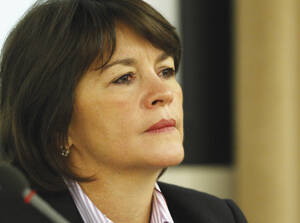There are many things still unclear about why Lesley-Anne Knight, secretary general of Caritas Internationalis, has been unexpectedly prevented from applying for a second term of office. It could be that the Vatican Curia is planning some radical structural changes and Knight is seen as an obstacle.
According to Caritas, its leadership “deeply regrets the decision of the Holy See.” The president of Caritas, Cardinal Oscar Andrés Rodríguez de Maradiaga of Honduras, voiced his “incomprehension” at the decision. The organization’s leadership bureau—Cardinal Rodríguez, Knight, the organization’s treasurer and seven regional presidents—met with Cardinal Secretary of State Tarcisio Bertone on Feb. 5, but they were unable to change the position of the Holy See on Knight’s reappointment.
On Feb. 15, Cardinal Bertone wrote to the bishops’ conferences of the world to explain that the Vatican was not going to renew Knight’s mandate after the general assembly of Caritas in May. In the three-page letter, Cardinal Bertone said Caritas needed a stronger Catholic identity. The next four years, he explained, would focus on “harmonizing the theological dimension of Caritas Internationalis...with its role as an organization operating on the international stage.” This would require, he said, greater cooperation with other ecclesial bodies and with Vatican dicasteries that have an “interest” in Caritas activities. Caritas’s advocacy work, he explained, needs to be better coordinated “in strict cooperation with the Holy See, which is specifically competent in this regard.”
A firmer Catholic identity and tighter bonds with the Vatican? Why not ask Knight to effect these changes? The head of the Pontifical Council Cor Unum, Cardinal Robert Sarah of Guinea, has indicated that Knight’s competence is not in question. Colleagues speak of her with great respect. She radiates intelligence and competence. And Cardinal Bertone in his letter insists that denying her a second term “is in no way to cast doubt on her merits or diminish the appreciation for the services she has already rendered.” So what is the problem with another term?
“We’re just as much in the dark as anyone else,” a source close to Knight said.
There are reports that Knight has drawn the ire of Vatican officials with “occasional blunt criticism about the church bureaucracy”; and her predecessor, Duncan MacLaren, who was secretary general for two terms (1999-2007), suggests that longstanding tensions between Caritas and Cor Unum, which oversees relief and development work for the Vatican, might be at work behind the decision.
Cardinal Sarah’s remarks seem to underline this clash of cultures. “We can be competent in organizing but lack some qualities for coordinating work or for reinforcing the Catholic identity,” he said, referring to Knight. He mentions “new internal challenges,” including the revision of the agency’s institutional statutes, which “involve internal collaboration, the Catholic identity of the confederation, cooperation with the Holy See, greater participation of the various continents, a proper understanding of the proper autonomy of each Caritas member of the confederation.”
Read between those lines, and Knight—together with the rest of Caritas leadership—stands accused in some Vatican quarters of being too independent of the Curia, too much like secular nongovernmental organizations and too inattentive to the presumably more traditional sensibilities of member organizations in the developing world.
The change of leadership at Caritas is in some ways reminiscent of the takeover of English liturgical translations from the International Committee on English in the Liturgy, which also had its origin in a dispute over authority—in that case, with the Congregation for Divine Worship.
Whatever else it may be, this shake-up is an assertion of control by Vatican departments suspicious of Caritas’s autonomy and global reach. Reforms may be coming to establish a direct supervisory role for Cor Unum and other dicasteries. But for what purpose? The liturgical translation fiasco should serve as a warning. Interference from above can create more problems than it solves.








